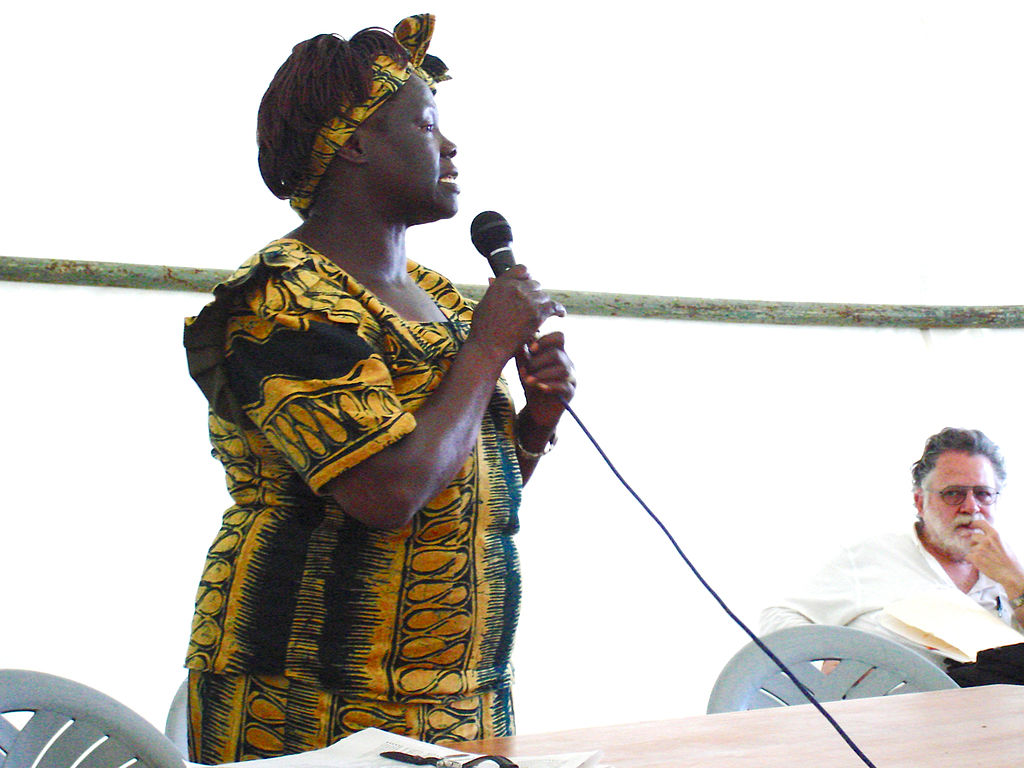In Praise of Wangari Maathai
Maathai, who died this week, stood up to the dictatorship of Daniel Arap Moi, and the global regimes of the IMF, the World Bank and all the rest.

Wangari Maathai speaking at the World Social Forum in 2007 (Wiki Commons).
Wangari Maathai passed this week. The news of her passing inspired memories, praise, and reflection, especially among those who knew and worked with her, and among those Kenyans who grew up watching her and then spent their adult lives learning to understand what they had seen as children.
Dr. Maathai was fierce. Indomitable. Passionate. Inspirational. She was a heroine. She stood up to the dictatorship of Daniel Arap Moi, and the global regimes of the IMF, the World Bank and all the rest. She organized, organized, organized. From the Uhuru Park demonstrations and “salvation” to the beatings and arrests, especially in 1999, through the post-Moi “democratic dispensation” to the present, Wangari Maathai organized. She organized women who then organized more women. She organized structures, most famously the Green Belt Movement. She organized events that were a model for others. When Ugandan women organized Women for Peace, in 2010, they cited Maathai’s “amazing demonstrations” and mobilizations of over 100,000 women. To the end, Dr. Maathai herself organize to end violence, to make the violaters accountable, to create real and sustainable peace.
In fact, Wangari Maathai never stopped teaching. She simply moved her classroom from the University of Nairobi to the streets and the world. She taught African women new ways of standing, news ways of organizing, new ways of mobilizing, and, importantly, new ways of securing victories.
Maathai taught that the time for action, for democracy, for justice, for women, is now: “In the course of history, there comes a time when humanity is called to shift to a new level of consciousness, to reach a higher moral ground. A time when we have to shed our fear and give hope to each other. That time is now.”
Upon news of her death, Professor Shadrack Gutto, of the Centre for African Renaissance Studies at the University of South Africa, suggested, “She belongs in the league of Nelson Mandela. Someone who fought for others and never thought of herself, working tirelessly to advance the freedom and dignity of others without expecting anything in return.”
Wangari Maathai stands in a league with the too-few women who have won the Nobel Peace Prize. She stands in a league with leaders, women and men like Nelson Mandela. She stands with the women of Kenya. She stands with the women of Africa. She stands with her innumerable daughters everywhere.
Except in some quarters of Western media. There, well … The photograph accompanying The Washington Post obituary for Wangari Maathai says it all. Dr. Maathai stands, beaming, between … Oprah Winfrey and Tom Cruise. After all the work, all the struggle, all the prison time and beatings, she gets to be upstaged by Oprah Winfrey and Tom Cruise and not a tree in sight.
Rest in peace Dr. Maathai. Your daughters, and some of their brothers, will carry on the work. Rest in peace and thank you.



















